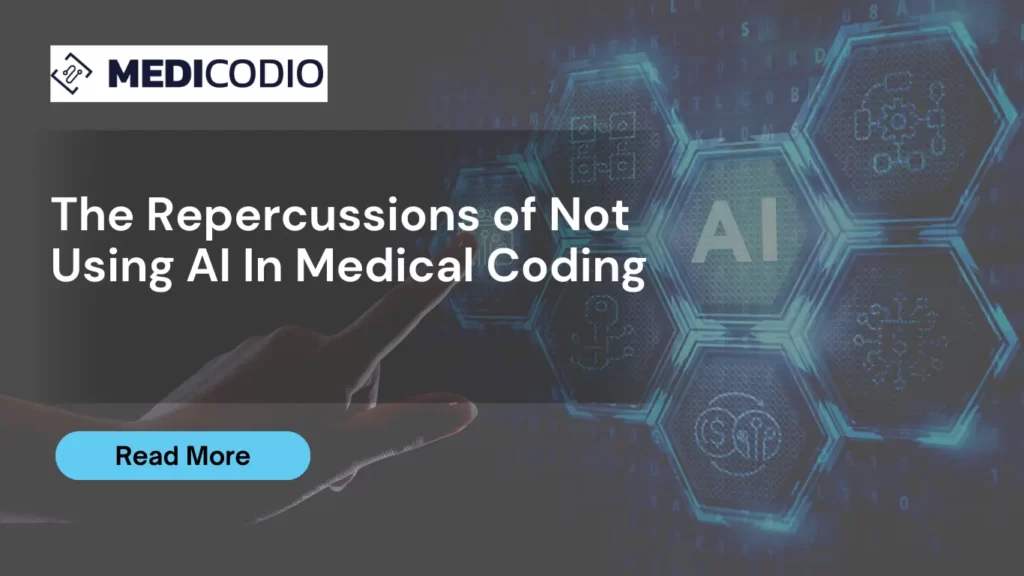Undoubtedly, Artificial Intelligence (AI) has swept across every aspect of the healthcare industry. One of the crucial areas where AI has made a significant impact is medical coding. However, our focus is not on simply deploying AI in medical coding. Instead, we want to help you understand the value that AI can create for your organization. “The technology you use impresses no one. The experience you create with it is everything.” – Sean Gerety, a UX/UI Geek.
We all know that medical coding is the vital link between patient care and healthcare reimbursement. AI can be used to automate the coding process, improve accuracy, and reduce errors. This can free up medical coders to focus on more complex tasks, such as reviewing and approving codes.
In this comprehensive article, we will delve deep into the repercussions of not using AI in medical coding, shedding light on the critical role it plays in healthcare efficiency, accuracy, and overall patient care.
So, what happens if you neglect to implement AI in Medical Coding?
The importance of AI in medical coding cannot be overstated. Here, we will discuss the various repercussions of neglecting AI in this vital healthcare process.
Without AI assistance, medical coding becomes a highly manual and error-prone task. Human coders may inadvertently make mistakes due to fatigue or oversight. These errors can lead to incorrect billing, denied claims, and even jeopardize patient care.
Reduced Efficiency
Traditional coding methods are time-consuming and labor-intensive. The absence of AI results in slower coding processes, leading to delayed reimbursements and extended patient wait times. Healthcare facilities may find it challenging to keep up with the ever-increasing volume of medical records.
Compliance Risks
AI in medical coding ensures that codes comply with the latest regulations and guidelines. Failure to use AI can result in non-compliant coding, leaving healthcare providers vulnerable to audits, fines, and legal issues.
Missed Revenue Opportunities
Inaccurate coding can result in underbilling or missed revenue opportunities. Healthcare facilities may fail to claim the full reimbursement they are entitled to, ultimately affecting their financial stability.
Impaired Data Analysis
AI-driven medical coding generates valuable data insights that can inform healthcare decisions. Without AI, the availability of such data is limited, hindering the identification of trends, outcomes, and areas for improvement.
Increased Workforce Burnout
Healthcare professionals tasked with manual coding may experience burnout due to the repetitive nature of the job. AI can alleviate this burden, allowing staff to focus on more complex and meaningful tasks.
Inefficiencies in Patient Care
Delayed coding can lead to delays in processing insurance claims and subsequently impact patient care. Timely and accurate coding is essential for ensuring that patients receive the right treatment and that healthcare providers are adequately compensated.
Higher Administrative Costs
Manual coding necessitates a larger administrative workforce, driving up operational costs. AI can streamline these processes, reducing overhead expenses for healthcare facilities.
Quality of Care
Ultimately, the repercussions of not using AI in medical coding can adversely affect the quality-of-care patients receive. Delayed coding, errors, and compliance issues can lead to suboptimal treatment and patient dissatisfaction.
Conclusion
The potential drawbacks of not using AI in medical coding are far-reaching, impacting not only the financial aspects of healthcare but also the quality of patient care. As the healthcare industry continues to evolve, embracing AI in medical coding is not just an option but a necessity. Healthcare facilities that recognize the significance of AI in this domain will undoubtedly thrive in an increasingly complex healthcare environment.
FAQs
Q: How does AI improve medical coding accuracy? AI employs advanced algorithms to analyze medical records and assign appropriate codes, reducing the likelihood of errors caused by human oversight.
Q: Are healthcare facilities required to use AI in medical coding?
While not mandatory, the adoption of AI in medical coding is highly recommended for improved efficiency and accuracy.
Q: Can AI adapt to changing coding regulations?
Yes, AI systems can be updated to align with the latest coding guidelines and regulatory changes, ensuring compliance.
Q: What are the cost implications of implementing AI in medical coding?
Initial implementation costs may vary, but the long-term benefits, including reduced administrative expenses and improved revenue capture, often outweigh the initial investment.
Q: Is AI capable of handling the complexity of medical coding?
AI systems are designed to handle intricate medical coding scenarios and can adapt to the evolving healthcare landscape.
Q: How can healthcare facilities transition to AI-driven coding seamlessly? The transition to AI-driven coding involves training staff, selecting suitable AI solutions such as MEDICODIO, and ensuring a smooth integration process.





